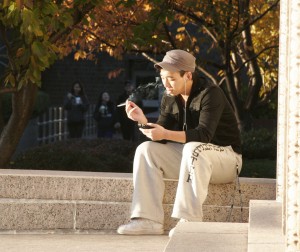A student-led, grassroots initiative is currently working toward the goal of making the River Campus a smoke-free environment.
The initiative began about a year ago when juniors Catie Tarantine and Sara Rothenberg were inspired to do an independent study after learning about SUNY Buffalo’s experience of going smoke-free.
At the end of the 2010-2011 academic year, Tarantine and Rothenberg began taking their study further, making presentations to the Students’ Association Senate as well as members of the UR staff. The initiative is still in its infancy, and immediate goals, according to Tarantine, are simply building momentum for the plan as they seek to learn what students think about the prospect of going smoke-free and work toward approaching higher administration.
Vice president of advocacy on Colleges Against Cancer (CAC) and sophomore Sheridan Finnie has stepped in for Rothenberg, to act as a link between CAC and the smoke-free initiatives.
“We’re just trying to create a more communal, community-aware environment where people can just go about their business without really affecting others,” she said.
There is also concern about the prevalence of second-hand smoke and its detrimental effects, especially on people suffering from bronchitis and chronic obstructive pulmonary disease.
“From a public health point of view it’s a huge, powerful intervention,” Scott McIntosh, associate professor of community and preventive medicine, said. He also pointed out that there is a significant increase in smoking cessation once campuses become smoke-free.
Although the hope of this initiative is that UR will become smoke-free, there are a number of other options still on the table, including UR’s current policy: no smoking allowed inside or within 30 feet of any University-owned buildings.
The initiative will also work toward creating designated smoking areas or going one step further and making UR a tobacco-free campus, a change that would include chewing tobacco in its restrictions.
In an effort to get a feel for student opinion, a survey was sent out via email, asking what students thought of the options available. Of the 300 students who responded to the survey, 62.3 percent believe that UR’s current policies need to be changed. The remaining 55.9 percent were in favor of a smoke-free campus.
There will be a forum on Monday, Nov. 14, where students will have a chance to be heard. There will also be a panel discussion at the end of the month to educate the community on the initiative. Although there is currently a focus on student opinion, if the initiative moves forward, UR will consider faculty and staff as well.
“As much as I have been working for this and … want [it] to go through, if there’s not support or other students do not want it, there is no driving force,” Tarantine said.
Sophomore Leah Reino is all for the initiative.
“A smoke-free campus would benefit the health of the students and maybe make the smokers think about the health risks of the activity they are partaking in,” she said.
Joe Strong, a cook who works in the Commons, was less enthusiastic.
“I don’t think it would be totally fair because some people still do smoke,” he said.
There has not yet been an official decision as to which policy UR will adopt though — this will be talked about in more depth once discussions are initiated with higher administration.
“We’re not trying to force anyone to quit smoking or really inconvenience anyone in any way,” Finnie said.
Tarantine had a similarly accommodating outlook. “As a university we should be trying to make [UR] acceptable to all people,” she said.
If and when a new policy is written, there will be a gradual introduction to the new rules.
This are not the first time changes to the UR’s smoking policies have been discussed. The UR Medical Center (URMC) went smoke-free in 2006 — smoking is now allowed only in two designated areas. According to McIntosh, who led this initiative, the transition was easier than expected.
“There are not as many people opposed to it as you would think and even some smokers are for it,” he said. He also noted that giving people a voice in the decision process can prevent excessive dissent once the policies are put into place.
According to McIntosh, it was believed that the River Campus would go smoke-free within a few years of URMC’s transition, but the switch never occurred.
“I’d say the University wasn’t ready at that point,” Dudman said.
The concept is now becoming more popular nationwide though, with an increasing number of colleges and universities reconsidering their smoking policies. As of Oct. 7, there were approximately 600 campuses that had gone 100 percent smoke-free, according to the American Nonsmokers’ Rights Foundation.
Tarantine also believes that once UR acknowledges this national trend, there will be more pressure to push these initiatives forward.
If these policies are enacted, there are several options for keeping up with their regulation, such as peer enforcement or fines.
But will these new policies infringe unfairly on people’s rights?
According to Tarantine, not necessarily. She explained that although anybody has a right to buy and smoke cigarettes, there is nothing that gives anyone the right to smoke them in certain places. Banning smoking outside, she says, is akin to banning it inside. The fact that UR is a private university also means that it can legally create its own policies.
Finnie is ready for potential backlash. “We’re not expecting everyone to agree with us, but at least understand where we’re coming from,” she said.
UR currently offers smoking cessation through health care providers and does maintain many programs and classes, but in the event that these initiatives become policies, this could change.
The initiative still has a ways to go before it can become policy. But according to Tarantine, a big objective is for the policy to be accepted by administration by the end of the current academic year, after which there will be a period of transition before it fully goes into effect.
Goldin is a member of the class of 2013.




